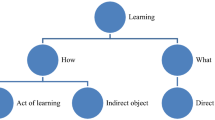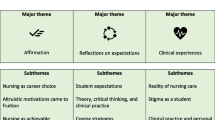Abstract
Objective: A study aimed at exploring the variation in conceptions of problem-based learning (PBL) held by undergraduate nursing students and their approaches to study in PBL in a pre-registration Bachelor of Nursing Course.
Method: Students were asked to respond to four open ended questions which focussed on their experience of PBL in a particular subject. Data were analysed in two phases using a modified phenomenographic analysis. In the first phase a set of categories of description were developed from the student responses. In the second phase the individual responses were classified in terms of the categories. The paper will describe the approach to the analysis, the categories identified, the relationship between the categories and discuss the implications for further research and teaching.
Results: The findings indicated that there was a substantial variation in the conceptions and approaches. The majority of students, however, held relatively unsophisticated conceptions of problem based learning which were related to relatively unsophisticated approaches to learning.
Conclusion: Students participating in their first PBL subject generally reported unsophisticated conceptions of and approaches to learning which were not linked to professional practice outcomes. However, those completing the last PBL subject had recognised the link between participation in the process and the development of knowledge and skills for professional practice.
Similar content being viewed by others
References
Andrews, M. & Jones, P.R. (1996). Problem-based learning in an undergraduate nursing programme: A case study. Journal of Advanced Nursing, 23, 357–365.
Barrows, H.S. & Tamblyn, R.M. (1980). Problem-based learning: An approach to medical education. New York: Springer Publishing Company.
Beavis, E.O. (1989). Illuminating the issues: probing the past, a history of nursing curriculum development-the past shapes the present. In E.O. Beavis & J. Watson (eds.) Toward a caring curriculum: A new pedagogy for nursing. pp 13–36. New York: National League for Nursing. Pub. No. 15-2278.
Biggs, J. & Collis, K. (1982). Evaluating the quality of learning the solo taxonomy (structure of the observed learning outcomes). New York: Academic Press.
Boud, D. (1981). Developing student autonomy in learning. Essex: The Anchor Press.
Boud, D. & Feletti, G. (1991). The challenge of PBL. London: Kogan Page Ltd.
Candy, P.C. (1990). Self direction for lifelong learning. San Francisco: Jossey-Bass Publishers.
Crawford, K., Gordon, S., Nicholas J. & Prosser M. (1994). Conceptions of mathematics and how it is learned: The perspectives of students entering university. Learning and Instructions, 4, 331–345.
Drinan, J. (1991). The limits of PBL. In D. Boud & G. Feletti (eds). The challenge of PBL. pp 315–321. London: Kogan Page Ltd.
Dwyer, J. (1993). Predicting self directed learning readiness: A problem or not? In G. Ryan (ed.) Research and development in problem based learning, Vol. 1. Sydney: The University of Western Sydney.
Entwistle, N.J. & Ramsden, P. (1983). Understanding student learning. London: Croom and Helm.
Marton, F. & Säljö, R. (1976). On qualitative differences in learning, outcome and process I and II. British Journal of Educational Psychology, 46, 4–11 and 115–127.
Marton, F. & Säljö, R. (1984). Approaches to learning. In F. Marton, D. Hounsell & N. Entwistle (eds.) The experience of learning. Edinburgh: Scottish Academic Press.
Prosser, M., Walker, P. & Millar, R. (1996). Differences in students' perception of learning physics. Physics Education, 31, 43–48.
Säljö, R. (1979). Learning in the learner's perspective. 1. Some common-sense conceptions (Reports from the Department of Education, University of Göthenburg). Göthenburg: Department of Education and Educational Research, University of Göthenburg.
Author information
Authors and Affiliations
Rights and permissions
About this article
Cite this article
Duke, M., Forbes, H., Hunter, S. et al. Problem-Based Learning (PBL): Conceptions and Approaches of Undergraduate Students of Nursing. Adv Health Sci Educ Theory Pract 3, 59–70 (1998). https://doi.org/10.1023/A:1009763324321
Issue Date:
DOI: https://doi.org/10.1023/A:1009763324321




